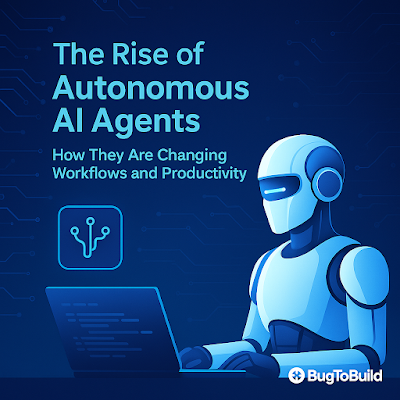The Rise of Autonomous AI Agents: How They Are Changing Workflows and Productivity
In recent times, the landscape of artificial intelligence has witnessed an exciting new frontier: the rise of autonomous AI agents. These agents, designed to perform complex tasks with minimal human intervention, are poised to redefine how businesses and individuals handle workflows and boost productivity. But what exactly are autonomous AI agents, and why are they creating such a buzz? Let’s dive deep into the phenomenon.

What Are Autonomous AI Agents?
Autonomous AI agents are advanced programs powered by artificial intelligence that can independently make decisions, plan actions, and execute tasks to achieve specific goals. Unlike traditional AI models that only respond to prompts, autonomous agents proactively perform a series of steps, continuously learning and adapting along the way.
Popular examples include tools like AutoGPT, AgentGPT, and BabyAGI. These agents use powerful models like GPT-4 in combination with memory systems, APIs, and planning capabilities to act on their own without constant human input.
Key Characteristics of Autonomous AI Agents
- Self-Initiated Actions: They identify objectives and determine the best steps to achieve them.
- Memory and Learning: They can store experiences and learn from past tasks to improve future performance.
- Goal-Oriented: Instead of just providing an answer, they work toward completing an overarching goal.
- Task Management: Capable of breaking down big tasks into smaller subtasks and executing them sequentially or in parallel.
How They Are Changing Workflows
In traditional workflows, many steps require manual effort or repetitive inputs. Autonomous AI agents are reshaping this model by:
1. Task Automation
Instead of hiring multiple people to research, write reports, scrape data, or perform market analysis, companies can deploy an AI agent to complete these tasks swiftly and accurately. This frees up human teams to focus on more strategic activities.
2. Multi-Step Planning
AI agents like AutoGPT can autonomously plan a sequence of actions needed to achieve a goal. For instance, if the goal is to create a new marketing strategy, the agent could research competitors, analyze customer behavior, create content ideas, and even generate marketing copy — all with minimal supervision.
3. Improved Decision-Making
Autonomous agents use vast datasets and real-time analysis to offer better insights and smarter decisions. They can factor in hundreds of variables simultaneously, something human teams would find extremely time-consuming.
4. 24/7 Productivity
Unlike humans, autonomous AI agents do not need sleep or breaks. They can work around the clock, improving turnaround times and speeding up project timelines significantly.
5. Personalized Assistance
Some AI agents are designed to act like personal assistants. They can manage emails, schedule meetings, send reminders, and even perform customer service tasks with a personalized touch.
Impact on Different Industries
- Marketing: AI agents can automate SEO audits, content creation, and social media management.
- Finance: They can monitor market trends, automate trades, and offer investment insights.
- Healthcare: Agents can assist in patient management, data analysis, and preliminary diagnosis suggestions.
- Software Development: Agents can automate testing, code generation, bug detection, and even basic app creation.
Challenges and Ethical Considerations
While autonomous AI agents offer enormous benefits, they also come with challenges:
- Trust: Can we rely on an AI agent to make the right decisions without supervision?
- Bias: Like any AI, agents can inherit biases from their training data.
- Job Displacement: Some routine and entry-level jobs could be automated, impacting employment patterns.
- Security: Autonomous agents accessing sensitive data must be tightly secured against cyber threats.
Ensuring transparency, accountability, and strong ethical guidelines is crucial to maximizing the benefits while minimizing risks.
The Future of Autonomous AI Agents
As technology advances, we can expect AI agents to become even more sophisticated. They will likely integrate with Internet of Things (IoT) devices, enterprise systems, and consumer apps to create fully automated, intelligent ecosystems. Future autonomous agents could manage entire business operations, develop creative strategies, or even collaborate with humans in highly complex projects.
Imagine a future where your AI agent not only organizes your day but also builds a custom app for your business idea, contacts potential clients, and handles your marketing — all while you sleep. That future is closer than we think.
Conclusion
The rise of autonomous AI agents is not just another technological trend — it’s a seismic shift in how we approach work, productivity, and innovation. Whether you are a developer, entrepreneur, or part of a larger organization, understanding and embracing this new wave could give you a significant edge in the coming years. Autonomous AI agents are not here to replace human creativity; they are here to enhance it, helping us achieve more with less effort.
Are you ready to collaborate with your AI teammate?

Post a Comment
0Comments